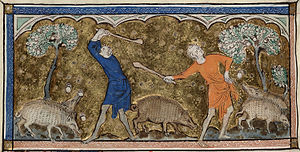

Pannage is the practice of releasing livestock-pigs in a forest, so that they can feed on fallen acorns, beechmast, chestnuts or other nuts. Historically, it was a right or privilege granted to local people on common land or in royal forests across much of Europe.[1] The practice was historically referred to as Eichelmast or Eckerich in German-speaking Europe while the fee to feed one's livestock in such a way was historically referred to as žirovina in Croatia and Slovenia.
Pannage had two useful purposes in the Middle Ages. While rooting around looking for nuts, pigs also turned the soil and broke it. Pig-rooting prevented soil compaction and released nutrients for plant growth. It also fattened pigs for slaughter.
Especially in the eastern shires of England, pannage was so prominent a value in the economic importance of woodland that it was often employed, as in Domesday Book (1086), as a measurement. Customarily, a pig was given to the lord of the manor for every certain number of pigs loosed de herbagio, as the right of pannage was entered.[1] Edward Hasted quotes the Domesday Survey details for Norton in Kent. "Wood for the pannage of forty hogs".[2]
Pannage is no longer carried out in most areas, but is still observed in the New Forest of Southern England, where it is also known as common of mast. It is still an important part of the forest ecology, and helps the husbandry of the other New Forest livestock – pigs can safely eat acorns as a large part of their diet, whereas excessive amounts may be poisonous to ponies and cattle.
The minimum duration of the New Forest pannage season is 60 days,[3] but the start date varies according to the weather – and when the acorns fall. The Court of Verderers decides when pannage will start each year. During other times, pigs are not allowed to roam the forest, with the exception that breeding sows (known as "privileged sows") are by custom allowed out, providing that they return to the owner's holding at night and are not a nuisance. The pigs each have several nose rings clipped into their noses to prevent them rooting too much and causing damage to grassland.
- ^ a b H. R. Loyn, Anglo-Saxon England and the Norman Conquest, 2nd ed. 1991:369.
- ^ Hasted, Edward (1798). "Parishes". The History and Topographical Survey of the County of Kent. 6. Institute of Historical Research: 401–413. Retrieved 6 March 2014.
- ^ Cooper, Graham. "The New Forest today: Common Rights". The New Forest. www.newforest.hampshire.org.uk. Archived from the original on 13 October 2007. Retrieved 26 July 2010.
